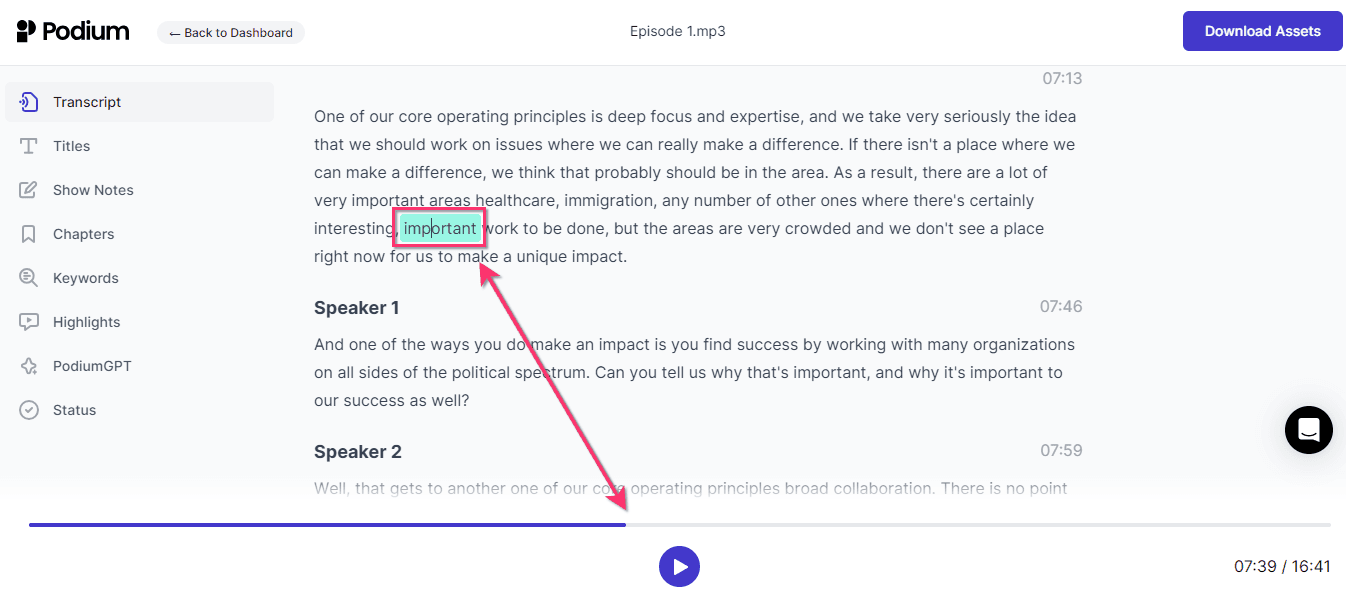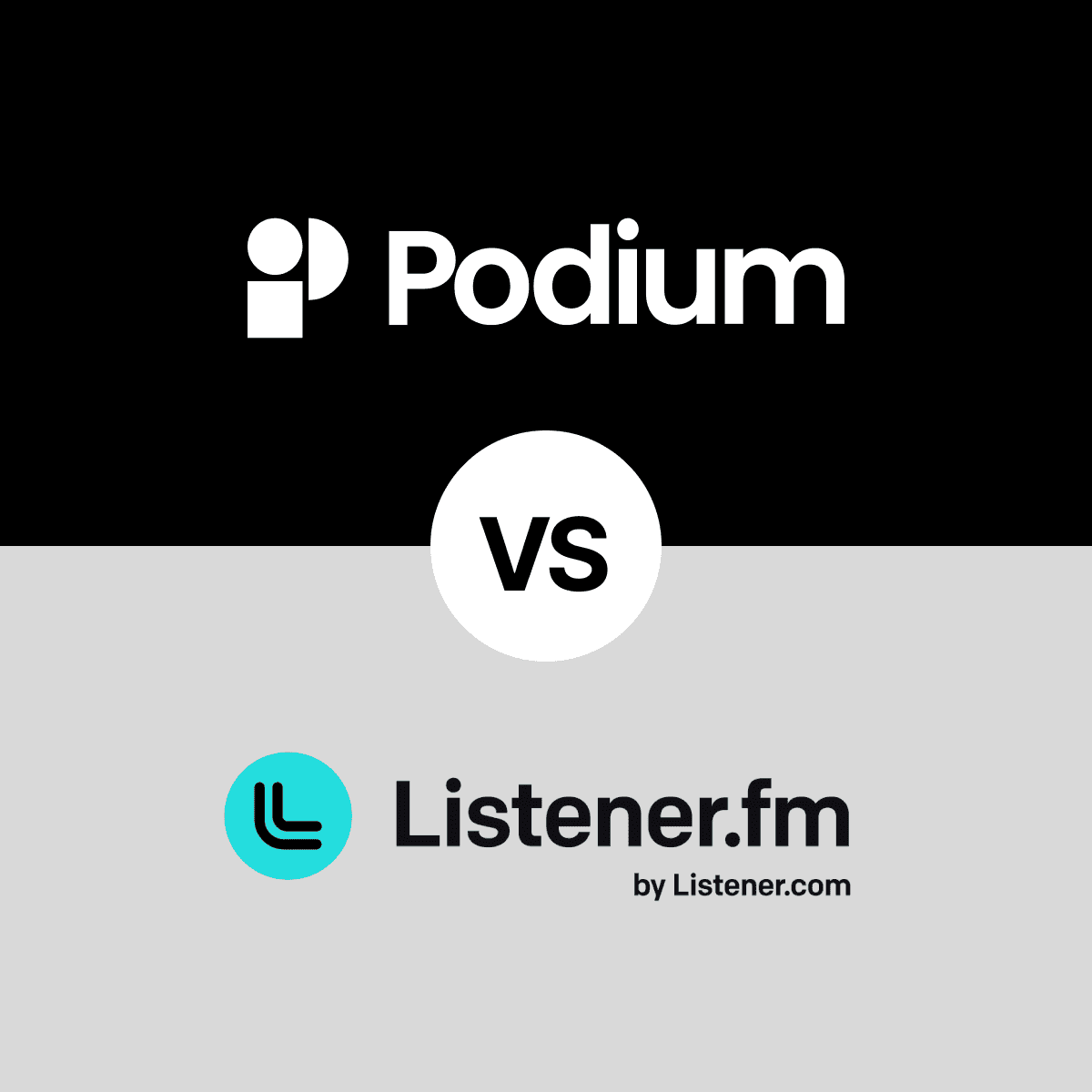Article
Listener.fm vs. Podium: Which Should You Use? [2024]
Podium and Listener are similar tools, here’s how they compare across features, quality and pricing
Summary
Choosing the right AI podcast copywriter for your show notes, transcripts, and other content is crucial for your podcasting workflow. This article provides an overview of the factors to consider when selecting an AI copywriter platform for podcast post-production and compares two emerging options: Listener and Podium.
Introduction
The podcasting industry is currently experiencing a significant transformation, thanks to the advent of AI-driven tools that facilitate post-production processes. These tools are adept at generating valuable content such as transcripts and show notes, catering to the evolving demands of podcast creators. As the industry continues to expand, an increasing number of podcasters are embracing these AI solutions to enhance their production workflows.
Podium and Listener.fm are two emerging choices among the growing pool of contenders. Both platforms offer a range of functionalities designed to streamline podcast production. Despite their apparent similarities, each has unique features and capabilities. In this article, we delve into a thorough comparison of Podium and Listener.fm, examining their respective strengths to determine which platform offers superior overall value to podcasters.
Accuracy of the Transcript
Podium's AI transcription stands out for its superior accuracy and nuanced understanding of language. The platform excels in correctly capturing punctuation and the proper use of grammatical elements such as question marks, resulting in transcripts that read naturally and coherently. Listener.fm, while proficient in transcription, does not quite match the finesse of Podium. It occasionally faces accuracy challenges, such as misinterpreting words (e.g., transcribing 'cup' as 'club') and lacks the effective use of punctuation marks found in Podium's transcripts. However, it's noteworthy that both platforms perform well in terms of speaker diarization, accurately identifying and differentiating between different speakers in a conversation.
Winner: Podium
Quality of the Output
In terms of content quality, particularly writing style, Podium clearly leads the way. The platform's show notes and summaries are characterized by their nuanced and natural tone, setting them apart from competitors in terms of depth and readability.
Conversely, Listener's summaries tend to be concise and straightforward, missing the depth and distinctiveness found in Podium’s content. Additionally, the approach to timestamps in Listener’s output is somewhat uneven, with descriptions varying significantly in length – some are detailed and paragraph-long, while others are brief, akin to simple headings. The platform also offers a limited range of title suggestions. Compared to the comprehensive and detailed nature of Podium's output, Listener’s content quality appears less robust, offering a more basic and less engaging user experience.
Winner: Podium
Features
Listener and Podium both offer a suite of core features essential for podcast production, such as transcription services, show notes summaries, chapters with timestamps, and title generation.
A distinctive feature of Podium is its highlights function, which pinpoints specific timestamps with potential for viral appeal. This tool is particularly useful for creating engaging, short-form content tailored for broader audience reach.
On the other hand, Listener provides additional content creation capabilities, including blog posts and social media posts, which are not standard offerings in Podium's basic package. However, Podium counters this with its AI assistant, PodiumGPT. This versatile tool is capable of generating not only blog and social media posts but also a wide array of other content types based on user input, offering extensive customization and flexibility.
Both platforms are enhanced with AI assistants, each contributing to a more streamlined and efficient content creation process. This similarity in AI-driven features reflects the platforms' commitment to leveraging technology for enriched podcast production experiences.
Winner: Tie
Ease of Use
Podium is recognized for its user-friendly interface, featuring a straightforward and intuitive layout. On the dashboard, files are systematically arranged, facilitating easy access. Within each file, content is thoughtfully organized into individual pages. A navigation pane positioned on the left side allows users to move between pages smoothly, enhancing the overall user experience.
Listener adopts a layout that is similarly user-friendly. Its interface also segregates file contents into separate pages, but with a distinct approach, utilizing a top navigation bar for transitioning between different sections. This setup ensures ease of navigation within the platform.
A notable addition to Podium's usability is its transcript editing feature, which includes synchronized audio playback. This integration streamlines the process of proofreading and editing transcripts, making it more efficient and user-friendly.

The ability to edit transcripts while listening to the corresponding audio significantly reduces the time and effort required for content refinement.
Winner: Podium
Integrations
Regarding file import capabilities, both Podium and Listener are equipped with straightforward systems for simple file uploads, accommodating the basic needs for content input.
When it comes to exporting content, Podium offers a more streamlined approach. Users have the convenience of downloading all generated content through a single download button, simplifying the process of content retrieval.
Listener, on the other hand, provides the option to download only the transcript directly. For other types of generated content, users are required to manually copy from the platform’s interface. This method can be less efficient for users looking to export multiple content types beyond the transcripts.
Winner: Tie
Pricing Model and Pricing Plans
Listener employs a free trial model, offering users the ability to process two uploads at no cost. Unique to Listener's pricing structure is the focus on the number of uploads rather than the duration of audio processing. Their subscription plans commence at $19 per month, which includes up to 4 uploads. Notably, Listener does not provide the option to purchase additional uploads outside of its subscription plans, making the choice of plan crucial for users based on their upload frequency.
In contrast, Podium's pricing model also begins with a free trial, allowing 3 hours of content processing. Following the trial, users can opt for either a subscription plan or purchase credits. The starting price for Podium's plans is $14 for 3 hours of content per month, with additional credits available at $9 per hour for non-subscribers and a reduced rate of $6 per hour for existing subscribers.
The divergent pricing models of Listener and Podium mean that each can cater to different user preferences. Listener is potentially more suitable for those with longer episodes, as the platform does not charge based on content duration. Conversely, Podium could offer better value for creators with shorter episodes, given that it does not restrict the number of uploads but rather the total hours of content processed.
Winner: Tie
Conclusion
Putting Podium and Listener.fm side by side, it becomes apparent that Podium stands out as a more refined and comprehensive tool. Although both platforms share a similar feature set, Podium takes the lead with its more accurate transcripts and overall superior content quality. This makes it a robust choice for users seeking precision and excellence in their podcasting tool. However, it's important to note the distinct pricing structures of the two platforms. This difference positions Podium and Listener.fm to cater to different segments of the market, each appealing to unique audience preferences based on their specific needs and budget considerations.
